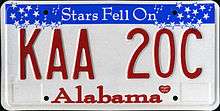Stars Fell on Alabama
"Stars Fell on Alabama" is the title of a 1934 jazz standard composed by Frank Perkins with lyrics by Mitchell Parish.
History
One of the earliest recordings was by the Guy Lombardo orchestra, with his brother Carmen doing a vocal. This version was recorded on August 27, 1934, and issued by Decca Records as catalog number 104.
The song was later performed by over 100 artists. Among them are: Al Bowlly, Lee Wiley, Ella Fitzgerald & Louis Armstrong; Cannonball Adderley with John Coltrane; Jack Teagarden; Jimmy Buffett; Billie Holiday; Anita O'Day; Dean Martin; Kay Starr; Frank Sinatra; Doris Day; Frankie Laine; Art Tatum; Erroll Garner; Don Rondo;Kate Smith; Mel Torme; Renee Olstead; Ricky Nelson; Stan Getz; Ben Webster; Vera Lynn; Tara Nevins; the Radcliffe Pitches; Ralph Marterie and Sonny Stitt on his album "New York Jazz".
The title appears to have been borrowed from the title of the 1934 book of the same name by Carl Carmer.[1] It refers to a spectacular occurrence of the Leonid meteor shower that had been observed in Alabama in November 1833, "the night the stars fell."[2] As reported by the Florence Gazette: "[There were] thousands of luminous bodies shooting across the firmament in every direction. There was little wind and not a trace of clouds, and the meteors succeeded each other in quick succession."
Modern use
The Marching Southerners of Jacksonville State University in Jacksonville, Alabama, perform an arrangement of the tune by previous band director John T. Finley at every home football game and exhibition. The song has become the unofficial anthem of both the Southerners and Jacksonville State University.

In January 2002, the phrase "Stars Fell on Alabama" was added to Alabama's license plates, and the traditional "Heart of Dixie" slogan was reduced to a smaller size. This design was replaced in early 2009 by another, which depicts the Gulf Coast of Alabama and reads "Sweet Home Alabama".
The song is also mentioned in "Powder", a short story by Tobias Wolff. The father hums the song as he and his son drive through a snow-covered landscape, hence the allusion to "a field of white." The novelist Percival Everett also refers to the song twice in Chapter 5 of his novel I Am Not Sidney Poitier.
See also
References
- Hall, John. (Winter 2000) "The Night the Stars Fell." Alabama Heritage Magazine No. 55
- Code of Alabama: Section 32-6-54 (1951) and 32-6-54.1 (1997). The amendment removes the requirement for special-purpose plates.
- ↑ Lewis Nichols, In and Out of Books, New York Times, Sept. 27, 1964.
- ↑ Southern Alabamian